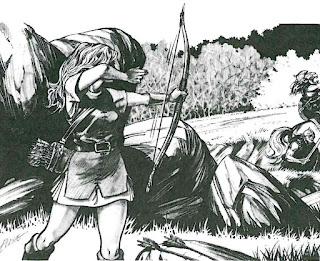Inspired by Aragorn
The original Ranger Sub-Class was designed by Joe Fischer for White box and appears in The Strategic Review: Vol.1, No.2. As a Sub-Class of Fighting Men, the Ranger shares something with the Paladin, another Sub-Class of Fighting Men. They must always be of Lawful alignment and Strength is their Prime Requisite, but they also have Intelligence, Wisdom and Constitution requirements, making the Ranger one of the most demanding character classes to qualify for.
Having rolled these amazing ability scores and decided you will play a Ranger, you are immediately rewarded with two full Hit Dice for hit-points. Using either the standard d6 or the Greyhawk d8, together with Constitution bonus (remember you must have at least a 15 score to qualify as a Ranger) your hit points are probably impressive. In a system where hit-points are the main way combat prowess is judged, the Ranger starts out relatively powerful.
Experience levels are rather costly, but until 8th level is attained, the Ranger receives 4 experience points for every 3 earned. That's a nice increase! They additionally have the ability to track most creatures in the wilderness or dungeon. They are also difficult to surprise and have tactical advantage (+1 per lvl to dam) on giant class monsters (Kobolds-Giants). In exchange they suffer restrictions regarding hirelings and followers, wealth and items carried and are limited to no more than two Rangers in a party.
Starting at eighth level (Ranger Knight) they begin to use additional magic including Cleric spells and some associated items. At ninth level (Ranger Lord) they begin learning Magic User spells in addition to Cleric spells making them one of the few classes able to employ both types of magic. The Ranger Lord attracts followers, may build strongholds and conceivably become a force in the power politics of the campaign.
Like most "new" character classes, the Ranger seems a bit over-powered compared to the standard classes. White Box is very adaptable and creating new character classes is a great way to shape the campaign towards a desired direction. The addition of the Ranger to the available character classes immediately makes the Wilderness Adventure more interesting and appealing. The Ranger also represents the presence of "higher men" among the milieu. Humans who are a little better than their peers, but makes such men frontiersmen on the fringe of society. Perhaps they are descendants of the "race of kings". The decision to add to or subtract from the pool of available character classes should be done thoughtfully and deliberately. Of course, that is not how we did it "back in the day". We added every new thing to the milieu with little thought given to its impact. None of this means much of anything unless we spend a little time thinking about our characters and campaigns. TSR used to have a slogan, "products of your imagination" which I really like...not their imagination, but ours! There is more to being the referee than drawing up a few maps. Taking the time to imagine the campaign you would like to run, then deliberately planning for it is in the referee's domain. Railroading a story-line is another thing altogether. Once play begins, in the best games I think the referee follows the players' lead, nudging only where necessary. Setting description and character class selection can inspire player imagination along certain paths and greatly influence the collective story which develops through play.

No comments:
Post a Comment